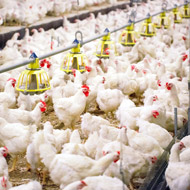Innovate UK funding to support chicken welfare projects

“As the industry has grown, so too have consumer concerns for animal welfare".
Bristol Veterinary School has been awarded two Innovate UK grants totalling almost £160k for projects into sustainable livestock production and improving chicken welfare.
The first project, 'Lighting for Broiler Enhanced Welfare and Commercial Output’ will be led by Dr Andy Butterworth, reader in farm animal science. It aims to further develop and test the first ever bio-adaptive, circadian, smart lighting system for broiler chickens that will recreate the properties of natural daylight.
“As the industry has grown, so too have consumer concerns for animal welfare,” Dr Butterworth explains. “Natural daylight, while the ideal, is not practical in all parts of the modern farming industry.
“Lighting has been demonstrated to impact productivity and welfare in the poultry industry but only day length and intensity are currently regulated to minimum standards. This project aims to achieve a step-change in lighting for animal husbandry, enhancing productivity and animal welfare in the food production industry, in the UK and globally.”
The second project will examine the feasibility of on-farm production of insect larvae from food waste to be used as a feed component for chickens.
Professor of regenerative medicine John Tarlton, who is leading the study, said: “The global population is expected to increase to nearly 10 billion by 2050. Alongside other problems of climate change and reduced agricultural land availability, feeding the world’s population is one of the greatest challenges facing humanity.
“Insects are one of the most efficient converters of protein and are able to do this from non-human edible food waste, a resource, totalling 1.3 billion tonnes each year. Unfortunately, most people in the world are reluctant to eat insects. However, chickens, the world’s greatest producers of animal protein for human consumption, have no such sensibilities. Indeed, they are enthusiastic consumers of insects.
“The aim of the study is to assess nutritional, health and welfare outcomes in chickens which aims to advance progress towards sustainable livestock production, with an emphasis on animal health and welfare.”



 The latest
The latest